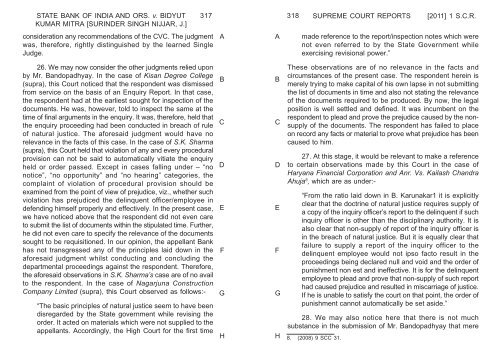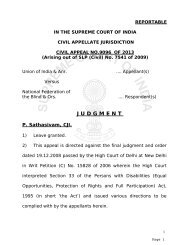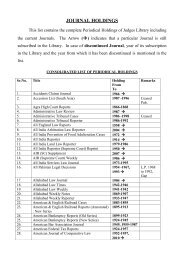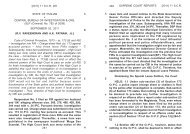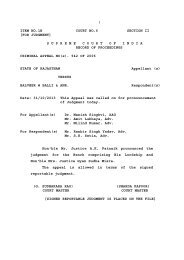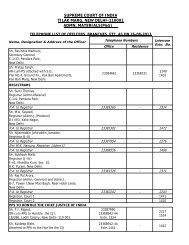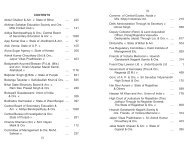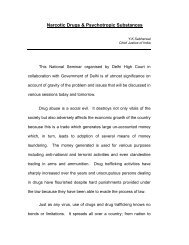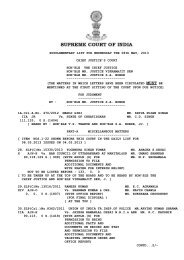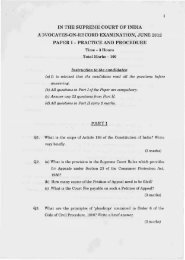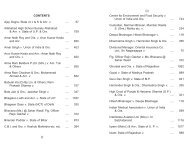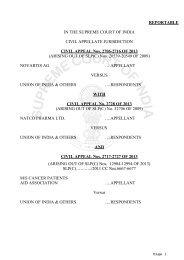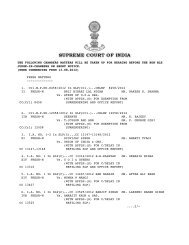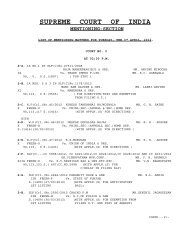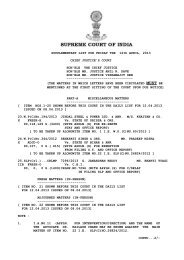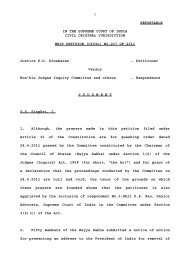Part No.II - Supreme Court of India
Part No.II - Supreme Court of India
Part No.II - Supreme Court of India
You also want an ePaper? Increase the reach of your titles
YUMPU automatically turns print PDFs into web optimized ePapers that Google loves.
STATE BANK OF INDIA AND ORS. v. BIDYUT<br />
KUMAR MITRA [SURINDER SINGH NIJJAR, J.]<br />
317 318<br />
consideration any recommendations <strong>of</strong> the CVC. The judgment<br />
was, therefore, rightly distinguished by the learned Single<br />
Judge.<br />
A<br />
A<br />
26. We may now consider the other judgments relied upon<br />
by Mr. Bandopadhyay. In the case <strong>of</strong> Kisan Degree College<br />
(supra), this <strong>Court</strong> noticed that the respondent was dismissed<br />
from service on the basis <strong>of</strong> an Enquiry Report. In that case,<br />
the respondent had at the earliest sought for inspection <strong>of</strong> the<br />
documents. He was, however, told to inspect the same at the<br />
time <strong>of</strong> final arguments in the enquiry. It was, therefore, held that<br />
the enquiry proceeding had been conducted in breach <strong>of</strong> rule<br />
<strong>of</strong> natural justice. The aforesaid judgment would have no<br />
relevance in the facts <strong>of</strong> this case. In the case <strong>of</strong> S.K. Sharma<br />
(supra), this <strong>Court</strong> held that violation <strong>of</strong> any and every procedural<br />
provision can not be said to automatically vitiate the enquiry<br />
held or order passed. Except in cases falling under – “no<br />
notice”, “no opportunity” and “no hearing” categories, the<br />
complaint <strong>of</strong> violation <strong>of</strong> procedural provision should be<br />
examined from the point <strong>of</strong> view <strong>of</strong> prejudice, viz., whether such<br />
violation has prejudiced the delinquent <strong>of</strong>ficer/employee in<br />
defending himself properly and effectively. In the present case,<br />
we have noticed above that the respondent did not even care<br />
to submit the list <strong>of</strong> documents within the stipulated time. Further,<br />
he did not even care to specify the relevance <strong>of</strong> the documents<br />
sought to be requisitioned. In our opinion, the appellant Bank<br />
has not transgressed any <strong>of</strong> the principles laid down in the<br />
aforesaid judgment whilst conducting and concluding the<br />
departmental proceedings against the respondent. Therefore,<br />
the aforesaid observations in S.K. Sharma’s case are <strong>of</strong> no avail<br />
to the respondent. In the case <strong>of</strong> Nagarjuna Construction<br />
Company Limited (supra), this <strong>Court</strong> observed as follows:-<br />
“The basic principles <strong>of</strong> natural justice seem to have been<br />
disregarded by the State government while revising the<br />
order. It acted on materials which were not supplied to the<br />
appellants. Accordingly, the High <strong>Court</strong> for the first time<br />
B<br />
C<br />
D<br />
E<br />
F<br />
G<br />
H<br />
B<br />
C<br />
D<br />
E<br />
F<br />
G<br />
H<br />
SUPREME COURT REPORTS [2011] 1 S.C.R.<br />
made reference to the report/inspection notes which were<br />
not even referred to by the State Government while<br />
exercising revisional power.”<br />
These observations are <strong>of</strong> no relevance in the facts and<br />
circumstances <strong>of</strong> the present case. The respondent herein is<br />
merely trying to make capital <strong>of</strong> his own lapse in not submitting<br />
the list <strong>of</strong> documents in time and also not stating the relevance<br />
<strong>of</strong> the documents required to be produced. By now, the legal<br />
position is well settled and defined. It was incumbent on the<br />
respondent to plead and prove the prejudice caused by the nonsupply<br />
<strong>of</strong> the documents. The respondent has failed to place<br />
on record any facts or material to prove what prejudice has been<br />
caused to him.<br />
27. At this stage, it would be relevant to make a reference<br />
to certain observations made by this <strong>Court</strong> in the case <strong>of</strong><br />
Haryana Financial Corporation and Anr. Vs. Kailash Chandra<br />
Ahuja 8 , which are as under:-<br />
“From the ratio laid down in B. Karunakar1 it is explicitly<br />
clear that the doctrine <strong>of</strong> natural justice requires supply <strong>of</strong><br />
a copy <strong>of</strong> the inquiry <strong>of</strong>ficer’s report to the delinquent if such<br />
inquiry <strong>of</strong>ficer is other than the disciplinary authority. It is<br />
also clear that non-supply <strong>of</strong> report <strong>of</strong> the inquiry <strong>of</strong>ficer is<br />
in the breach <strong>of</strong> natural justice. But it is equally clear that<br />
failure to supply a report <strong>of</strong> the inquiry <strong>of</strong>ficer to the<br />
delinquent employee would not ipso facto result in the<br />
proceedings being declared null and void and the order <strong>of</strong><br />
punishment non est and ineffective. It is for the delinquent<br />
employee to plead and prove that non-supply <strong>of</strong> such report<br />
had caused prejudice and resulted in miscarriage <strong>of</strong> justice.<br />
If he is unable to satisfy the court on that point, the order <strong>of</strong><br />
punishment cannot automatically be set aside.”<br />
28. We may also notice here that there is not much<br />
substance in the submission <strong>of</strong> Mr. Bandopadhyay that mere<br />
8. (2008) 9 SCC 31.


